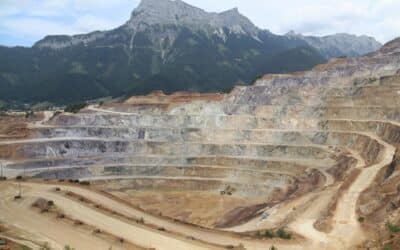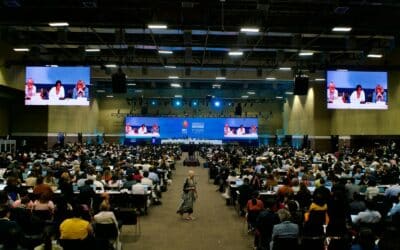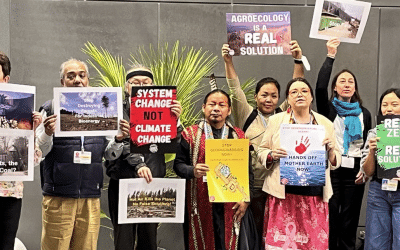by Heinrich Böll Foundation and ETC Group
It has been almost a decade after the landmark moratorium on all climate-related geoengineering was passed by the Convention on Biological Diversity (CBD) in 2010 and several years since the decision of parties to the London Protocol of the London Convention on marine dumping prohibiting ocean fertilization and potentially other marine geoengineering proposals.
Today, geoengineering is on the agenda of another UN body: the UN Environment Assembly.
At the 4th meeting of UNEA on March 11-15, 2019 in Nairobi, Kenya, the international community will discuss a draft resolution on geoengineering governance, tabled by Switzerland and, as of 5 March 2019, co-sponsored by the other members of EIG (the Environmental Integrity Group, a negotiating bloc in the UNFCCC consisting of South Korea, Mexico, Liechtenstein, Monaco and Georgia), and a number of other member-states: Burkina Faso, Federated States of Micronesia, Mali, Niger, Senegal, Montenegro, and New Zealand.
The Swiss resolution calls for an assessment of the status of geoengineering technologies and of potential governance frameworks for each technology. An Ad Hoc Independent Expert Group is supposed to “advise the Executive Director on the development of the aforementioned assessment.“
The assessment would be delivered by August 2020 and could likely provide the basis for future decisions on regulatory mechanisms – by UNEA and other international bodies – building on the assessment.
As part of international civil society that is firmly opposed to the idea of engineering the planet in the name of preventing climate change, we find the current draft version of the Swiss resolution very worrying. If adopted, this resolution could put the world on course to governance of geoengineering as a fait accompli.
However, the question of governance should not skip the question of whether such high-risk and potentially devastating technologies should be developed at all; in fact, that should be the first and foremost question. In other words: “Governance” should not be understood to mean governance of deployment or implementation, but needs to include the consideration of an international ban.
There is significant potential for geoengineering experiments and deployment to worsen the climate crisis, both because of its potential impacts and because it provides a justification for high greenhouse gas emitters to continue emitting and delay real reductions.
The 2019 report “Fuel to the Fire: How Geoengineering Threatens to Entrench Fossil Fuels and Accelerate the Climate Crisis” by the Center for International Environmental Law clearly exposes the old-time links between the oil industry and the promotion of geoengineering and explains how the sprawling propaganda that geoengineering is needed to address climate change is actually undermining climate goals while locking in fossil fuel infrastructure for decades to come.
To be clear: At Geoengineering Monitor, we‘re for a ban on geoengineering, due to the inherent global and transboundary nature, the high risks and serious potential impacts of geoengineering and therefore, a clear, robust and accountable multilateral governance mechanism is needed to hold the ban. We also believe that the UN is the only appropriate institution to take on the issue of geoengineering governance.
It’s crucial that for any discussion on geoengineering governance, the objectives, criteria and processes towards a global mechanism are clear. For it to be a legitimate discussion on geoengineering governance, it must be based on multilateral, transparent and accountable deliberations, in which all governments can freely participate in a democratic manner, open to public scrutiny and with the full participation of civil society organisations, Indigenous Peoples and social movements. It must be free from corporate influence, respectful of existing international laws and decisions, based on the precautionary principle, and be mindful of the concomitant global crises, such as hunger, poverty, inequality, loss of biological diversity, ecosystem destruction, atmospheric pollution and ocean acidification, and must consider the wide-ranging and manifold potential risks and impacts of geoengineering testing and deployment on the environment and societies that go way beyond climate-related issues.
We don‘t see those criteria defined in the Swiss draft resolution. We therefore believe the resolution should be reformulated to:
- Acknowledge the decisions taken by other United Nations bodies, namely the Convention on Biological Diversity (CBD) and London Convention/London Protocol as the starting point and foundation for deliberations on any governance mechanisms, and ensure that the Decisions and Resolutions adopted by member-states in the CBD and LP/LC are not undermined or downplayed;
- Acknowledge the precautionary principle as a core guideline in environmental law and governance;
- Reflect and assess the wide-ranging and multi-faceted impacts of the testing and deployment of geoengineering technologies on the environment, but also the profound risks for societies, and for Developing Countries in particular, for food security, international peace and security, democracy, for Indigenous Peoples, women and children;
- Ensure that the Ad Hoc Expert Group represents the knowledge, interests and views of those potentially most affected by geoengineering, including Indigenous Peoples, Women, Youth and civil society;
- Ensure that the Ad Hoc Expert Group is free of conflicts of interest, such as fossil fuel industry interests, investors or stakeholders in geoengineering companies or researchers with patents on geoengineering or other conflicting commercial interests, by establishing a robust Conflict of Interest policy;
- Set up a multi-stage review process that allows Governments and Civil Society to comment on draft versions of the assessment as Expert Reviewers.
At a time when open-air geoengineering experiments are either being conducted or planned in Alaska, California and New Mexico in the United States, the bottom line is that the most pressing need in global geoengineering governance is enforcement of the existing moratoria on all geoengineering activities. We need a full ban on open-air experiments. All efforts should start there.



